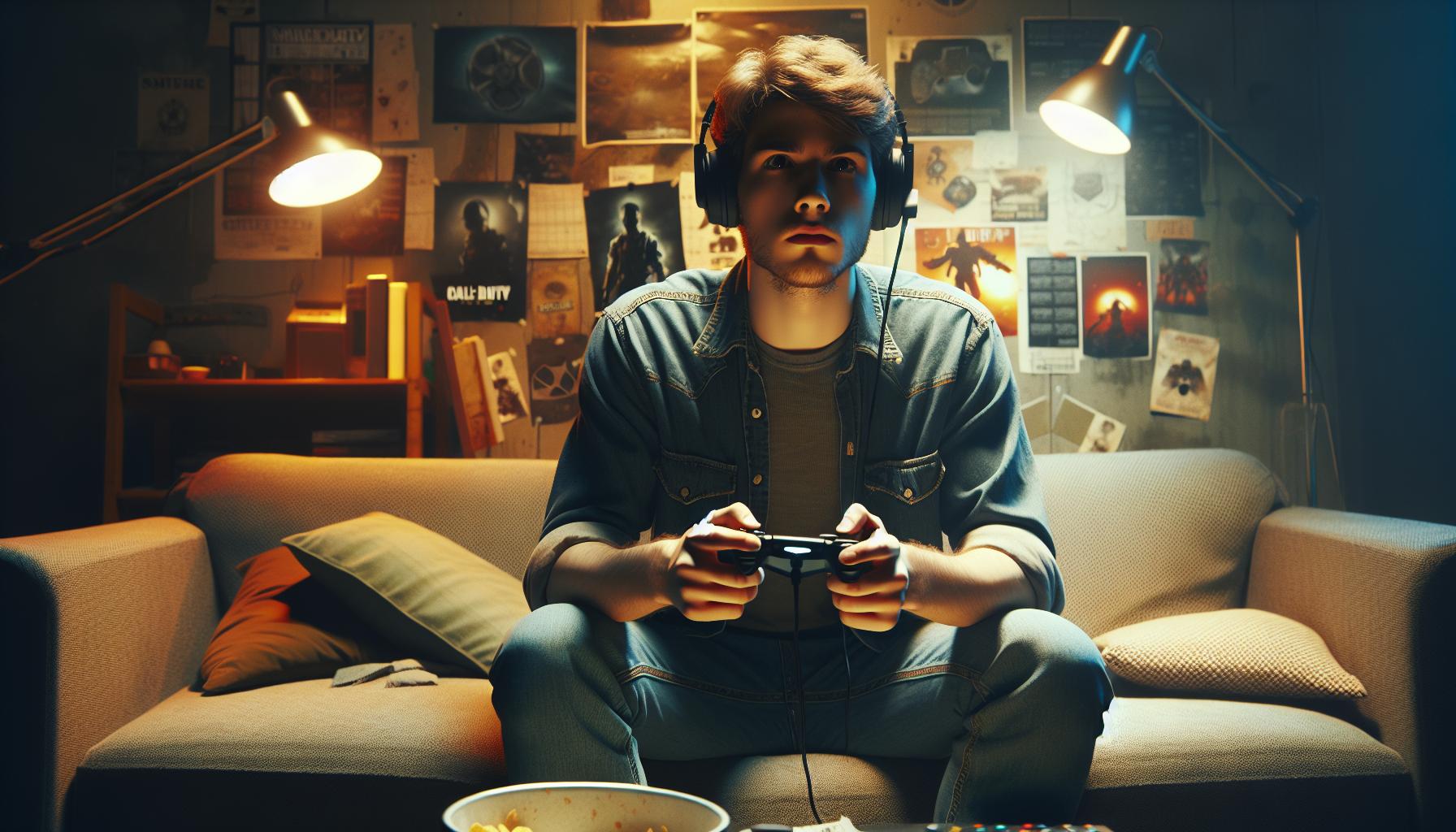In recent years, gaming has surged in popularity, captivating millions around the globe. While it offers entertainment and social connections, the darker side of gaming deserves attention. Critics argue that excessive gaming can lead to negative consequences for mental and physical health, academic performance, and social interactions.
Many gamers find themselves trapped in virtual worlds, often neglecting real-life responsibilities. This immersion can foster addictive behaviors, leading to isolation and decreased productivity. As gaming technology evolves, understanding the potential pitfalls becomes essential for players, parents, and society as a whole. Exploring the reasons why gaming can be detrimental sheds light on the importance of balance in a world increasingly dominated by screens.
Key Takeaways
- Impact on Mental Health: Excessive gaming is linked to increased anxiety, depression, and cognitive decline, highlighting the importance of moderation for mental well-being.
- Physical Health Risks: A sedentary lifestyle associated with prolonged gaming can lead to obesity, poor posture, and sleep disruptions, making physical activity essential.
- Social Isolation: Gamers often prefer virtual interactions over real-life connections, resulting in weakened interpersonal skills and increased feelings of loneliness.
- Academic and Career Consequences: Extended gaming can detract from responsibilities, leading to declining academic performance and job distractions, which can limit personal and professional growth.
- Need for Balance: Achieving a balance between gaming and real-life activities is crucial for maintaining overall health, social relationships, and responsibilities.
Why Gaming is Bad
Gaming exerts a significant influence on individuals across various aspects of life, particularly mental health, physical health, and social interactions. Several studies link excessive gaming with detrimental effects on mental health, including heightened anxiety, depression, and stress levels. Players immersed for extended periods may experience diminished attention spans and cognitive decline.
Physical health concerns arise when gamers spend long hours seated. Sedentary lifestyles contribute to issues such as obesity, poor posture, and repetitive strain injuries. The World Health Organization classifies gaming disorder as a mental health condition, emphasizing the need for moderation and awareness.
Socially, extensive gaming often correlates with weakened interpersonal relationships. Players might prioritize virtual interactions over real-life connections, which can foster loneliness and social isolation. Research indicates that youth who engage excessively in gaming report lower levels of life satisfaction and difficulty maintaining meaningful relationships.
The balance between gaming and real-life responsibilities remains crucial. Awareness of these negative impacts encourages players to adopt healthier habits, integrating gaming into a well-rounded lifestyle without compromising mental and physical well-being.
Physical Health Concerns

Excessive gaming poses various physical health risks that can affect overall well-being. Key issues include a sedentary lifestyle and sleep disruption.
Sedentary Lifestyle Effects
Sedentary behavior resulting from prolonged gaming can lead to significant health issues. Research indicates that spending over three hours a day on gaming correlates with increased risks of obesity and cardiovascular diseases. Gamers often neglect physical activity, which contributes to muscle atrophy and poor posture. Long hours in front of screens can also result in repetitive strain injuries, such as carpal tunnel syndrome. Engaging in regular physical exercise, even in short bursts, can mitigate these risks.
Sleep Disruption
Gaming often disrupts sleep patterns, impacting physical health. Studies show that 60% of gamers experience sleep problems related to gaming. Extended screen time before bed reduces melatonin production, which hinders sleep quality. Insufficient sleep can lead to weight gain, weakened immune response, and increased stress levels. Establishing a gaming curfew and limiting screen exposure before sleep can improve overall health and well-being.
Mental Health Issues

Excessive gaming can significantly impact mental health, leading to various serious conditions, including addiction and increased anxiety and depression. These effects emerge due to the immersive nature of gaming and its potential to disrupt essential life activities.
Addiction and Dependency
Gaming addiction presents as a compulsive need to play, often disregarding personal responsibilities. Studies indicate that about 3-10% of gamers may develop gaming disorder, which impairs daily functioning. Symptoms include preoccupation with gaming, loss of interest in other activities, and continued gaming despite negative consequences. This dependency can result in neglecting work, education, and relationships, fostering isolation and diminished social skills.
Increased Anxiety and Depression
Research consistently connects excessive gaming with increased anxiety and depression. Affected individuals may experience heightened stress levels and emotional disturbances, which can arise from social comparison within gaming environments or toxic online interactions. A study published in the journal Cyberpsychology, Behavior, and Social Networking found that gamers who spend more than three hours daily reported elevated rates of anxiety and depressive symptoms. Additionally, prolonged gaming can disrupt sleep patterns, further exacerbating these mental health issues.
Social Implications

Excessive gaming leads to various social drawbacks. It affects personal interactions and relationships, often resulting in negative outcomes for individuals and their communities.
Decreased Face-to-Face Interaction
Decreased face-to-face interaction arises from prolonged gaming sessions. Gamers may choose virtual interactions over real-life conversations, missing opportunities to develop essential social skills. Engaging with live peers fosters communication, empathy, and emotional intelligence, all of which can erode when replaced by screen-based interactions. Research indicates that individuals who spend significant time gaming exhibit lower levels of social competence and may struggle with real-world interpersonal situations.
Impact on Relationships
Impact on relationships occurs as gaming takes precedence over family and friendships. Gamers often prioritize gaming over significant life events, leading to emotional distance and strained connections. This behavior can result in a decline in relationship satisfaction, as partners and family members feel neglected. Studies show that partners of avid gamers frequently report feelings of isolation and resentment, highlighting the critical need for a balance between gaming and personal relationships. Maintaining healthy connections requires effort, and neglecting them in favor of gaming can lead to long-term emotional consequences.
Academic and Career Consequences
Excessive gaming can significantly impact academic and professional success, leading to detrimental outcomes in both areas. Increased screen time often detracts from essential responsibilities, creating lasting consequences.
Declining Academic Performance
Declining academic performance frequently results from extended gaming sessions. Students may prioritize gaming over studying, leading to missed assignments and poor grades. Research indicates that gamers who play more than three hours daily report lower GPAs compared to peers who game less. Distractions from gaming can hinder concentration and information retention, further exacerbating academic struggles. Moreover, excessive gaming introduces a risk of developing procrastination habits, where gamers delay tasks in favor of playing, ultimately impacting their educational trajectory.
Career Distraction
Career distraction is a common issue among individuals immersed in gaming. Prolonged gaming can lead to a lack of focus and productivity in professional settings. Gamers may find themselves preoccupied with thoughts of their virtual experiences instead of dedicating time to work tasks. Surveys reveal that 40% of adult gamers acknowledge gaming habits distracting their professional responsibilities. This distraction can manifest in missed deadlines, decreased job performance, and strained workplace relationships. Ultimately, excessive gaming can result in diminished career advancement opportunities, limiting personal growth and professional satisfaction.
Balancing Gaming With Real-life Interactions And Responsibilities
Gaming offers both entertainment and social opportunities but its negative effects can’t be ignored. The potential for addiction and the decline in mental and physical health are serious concerns. Furthermore the impact on academic performance and professional responsibilities highlights the need for moderation.
Balancing gaming with real-life interactions and responsibilities is crucial. By adopting healthier gaming habits and prioritizing well-being individuals can enjoy the benefits of gaming without sacrificing their mental and physical health. It’s essential to recognize the fine line between enjoyment and excess to foster a more fulfilling and balanced lifestyle.